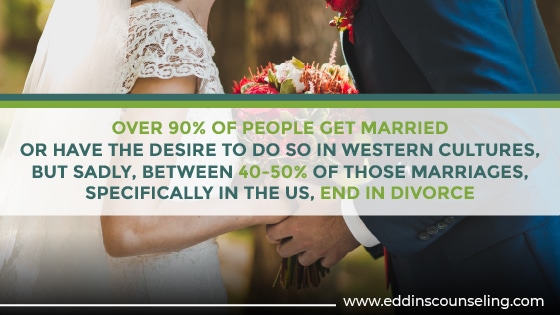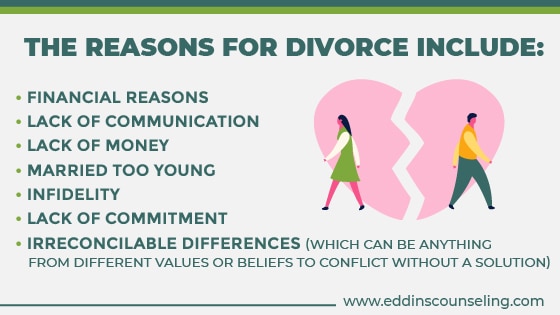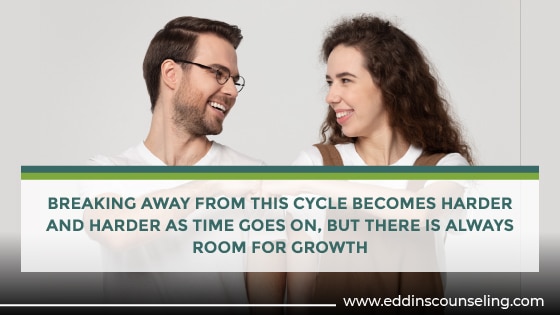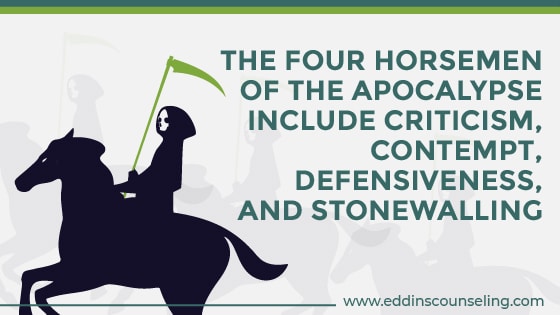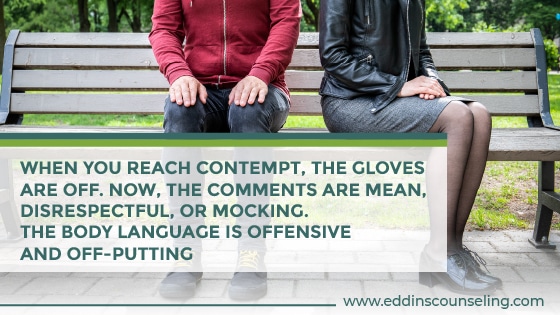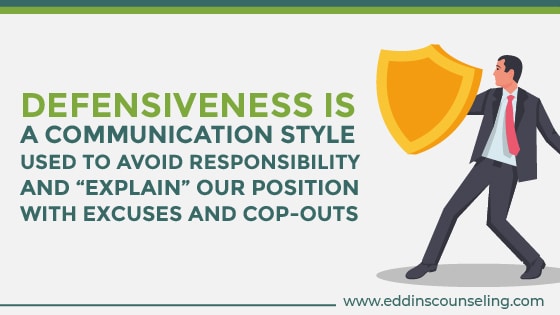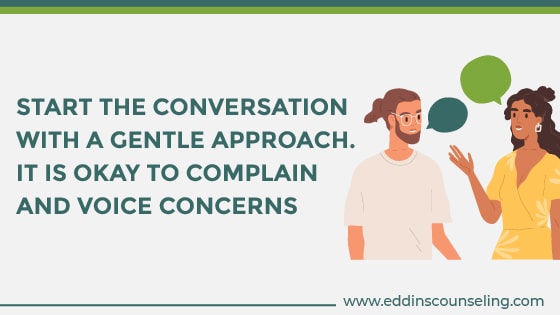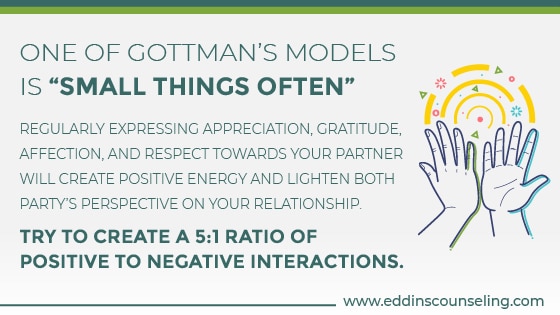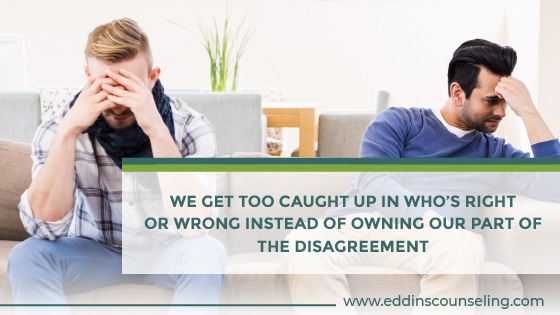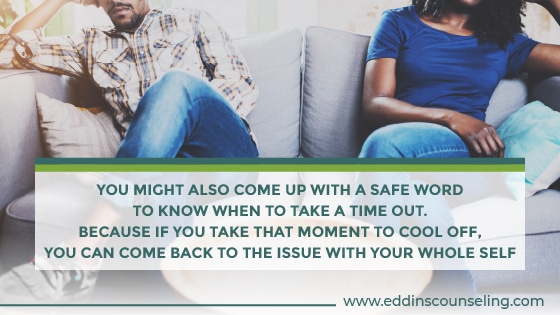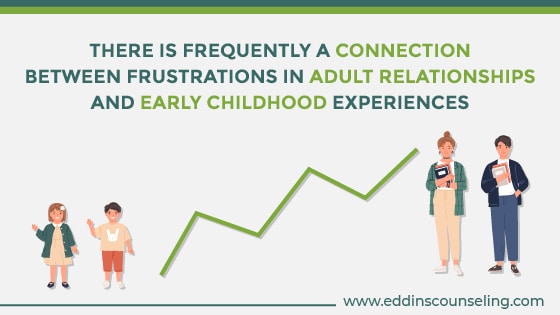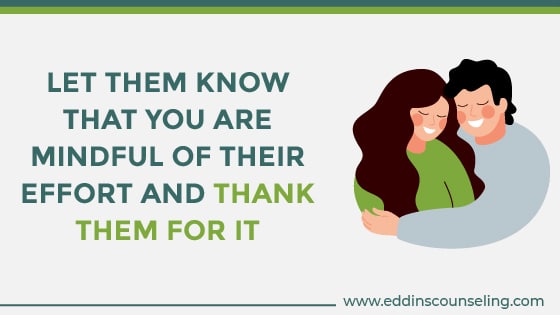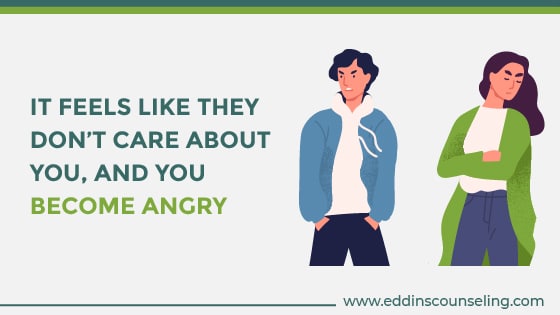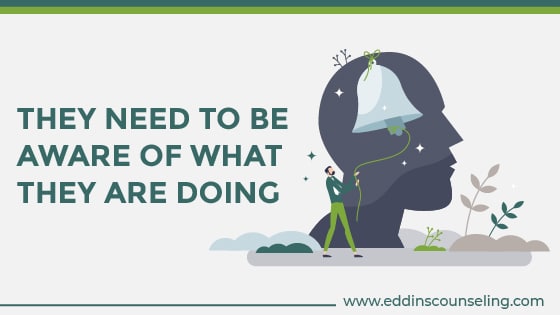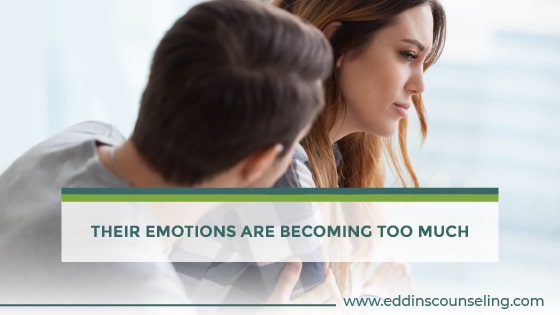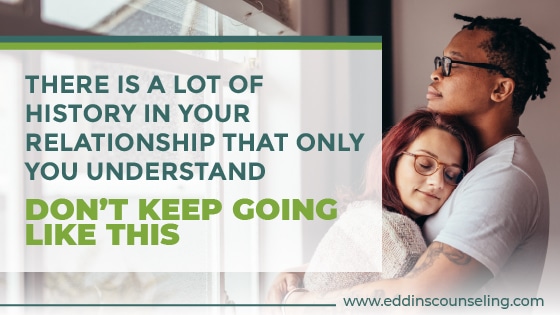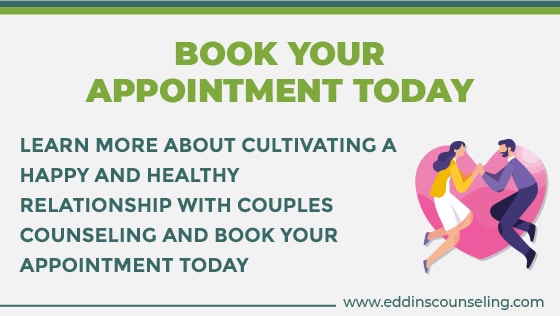August 23, 2021
Strategies to Improve Communication in Relationships
Written by Sara Lane
Posted in Relationships, Couples, Marriage and with tags: Communication, Couples & Marriage
Relationships can be hard.
But we often make them harder with relatively simple oversights. Jenet Dove, LPCA, gave a webinar called “Strategies for Effective Communication in Relationships”. It’s all about how couples can lose sight of each other and how the best way back is through effective communication.
You can find the video of the webinar below.
We Never Learned How to Communicate in Relationships
When we are growing up, we are taught everything we know about everything. The adults in our lives were our professors on how to be in relationships, no matter how unqualified they were.
So, most of us never learned about the culture of relationships, what healthy communication is, and how we maintain a relationship or marriage. And the result is “the ugly truth,” a well-known statistic about marriage in the West, which is as follows.
The American Psychological Association has confirmed that over 90% of people get married in Western cultures or have the desire to do so. Still, between 40-50% of those marriages, specifically in the US, end in divorce.
What researchers find the most interesting is the desired aspect and how it related to the result. This statistic tells us that even though people want to be married, they don’t know how to stay married.
Why All Relationships Fall Apart
The research has found that the reasons for divorce, in no particular order, are:
- Financial reasons
- Lack of communication
- Lack of money
- Married too young
- Infidelity
- Lack of commitment
- Irreconcilable differences (which can be anything from different values or beliefs to conflict without a solution)
The Core Problem: Ineffective Communication in Relationships
Throughout all of the surveys, poor communication between spouses was always a top reason for ending things. And of all the issues, that one is the most preventable.
Most couples counseling sessions are spent working solely on communication. They work on building a culture of healthy communication in your relationship because most other problems come from that.
Issues with money or intimacy are sourced from poor communication. We can’t express our true feelings, positions on specific topics, or get our needs met.
We end up reinforcing habits that stunt communication rather than convey problems in a way that promotes healthy dialogue. Essentially, we go back to our training.
If our parents, for example, never addressed hard feelings like pain, loss, anger, or fear and pretended that nothing happened, that might be what your instincts tell you to do in more challenging situations.
Breaking away from this cycle becomes harder and harder as time goes on, but there is always room for growth. But you have to develop that positive culture where you are both welcome and free to express yourselves to each other.
Neither of you deserves a relationship where you cannot be yourselves, and that’s why we start with using effective communication strategies.
Everything stems from communication.
The Gottman Method, Predicting Divorce
John Gottman is a psychological researcher and clinician. He developed what has come to be known as the Gottman Method, a therapeutic approach to couples therapy that assesses couples and intervenes with research-backed tactics.
Specifically, we are referring to a long-term study that observing over 700 couples. They discovered factors that distinguished happy, stable couples from unstable, unhappy couples more likely to divorce.
They can predict the success of a marriage with over 90% accuracy. But, on the other hand, Gottman and his team defined the four communication styles that overwhelmingly indicate a relationship ending.
The Four Horseman of the Apocalypse
A concept that originated in the New Testament illustrated the end of times; Gottman uses the metaphor to demonstrate four communication styles that are the opposite of effective communication.
He found that when couples in conflict use any of these styles, they are far more likely to have an unsuccessful relationship.
As you learn about these styles, you’ll be able to identify them in past and present relationships. We want to avoid these when creating that positive culture in our marriage.
Criticism
This style looks like a verbal attack of a personality trait. It often gets confused with voicing a complaint or offering a critique. But there is a crucial difference.
One addresses a specific complaint related to a particular issue versus the other that criticizes someone, going after the core of their character.
Things that are said in this style sound like:
- “You never think about me.”
- “You never think about how your behavior is affecting other people.”
- “You’re just selfish.”
- “You never think about others.”
The attacks are very personal and directed at the person’s traits. Any of these comments are aimed to hurt, whether that is the intention or not, and will not produce results you’ll be proud of.
Contempt
When you reach contempt, the gloves are off. Now, the comments are mean, disrespectful, or mocking. The body language is offensive and off-putting.
There is a lot of talking down, nasty name-calling and letting the other person know how useless they are. This communication style is the farthest thing from “effective communication” because it forces a position of superiority.
One party is beneath the other. The other person feels worthless because these words go beyond criticism.
And it’s all usually fueled by negative thoughts that are festering within the agitator.
Dr. Gottman has identified contempt as the single greatest predictor of divorce.
Do you and your partner need help? Here are 7 Signs You Need Couples Counseling.
Defensiveness
A typical response to criticism, defensiveness is a communication style used to avoid responsibility and “explain” our position with excuses and cop-outs.
As righteous as it feels to defend oneself, this position is relatively unproductive. It comes off as playing the victim and an attempt to place blame on the other.
For example, let’s say one partner asks the other a question. “Did you call and tell them we can’t make dinner tonight?” Some things we might hear include:
- “No, I was too busy.”
- “You know I was busy. Why didn’t you call them?”
- “Do I have to do everything myself?”
- “Dinner with them was your idea. I didn’t even want to go.”
Almost no success comes from making our partner feel like we won’t own up to our mistakes. It will always escalate the conflict.
Stonewalling
Once an argument has escalated, someone becomes overwhelmed with emotion that becomes unmanageable. The person doing this is unable to process it all. They shut down and stop responding.
Unable to confront the issue, they use evasive maneuvers to get out of the conversation.
Some of these “evasive maneuvers” can look like:
- Going silent
- Turning away
- Walking away
- Engaging in an activity apart from the conversation
Have You Seen These in Your Relationships?
There is no shame in admitting that you have witnessed these behaviors in your relationships and even acted upon them yourself. It is much better to say that you did and grow from there than the deny it all and change nothing.
You need to adjust how you convey your needs and switch to effective communication strategies rather than using these sort of useless ones.
Your relationship is not doomed. But to continue engaging in these ways without awareness or a willingness to change will only create more issues. Even by reading this, you are taking the first step in your journey toward a happier and healthier relationship.
But there is one thing that we want to make very clear. No change will happen if both parties are not involved. Both of you need to be motivated to make corrections. If this is not something you believe is possible, we recommend seeking out a therapist immediately.
|
|
How to Improve Communication in Relationships
There is some good news. For every horseman, there is an antidote that you can learn to use in these escalations with your partner.
1. Criticism Antidote
If criticism is verbally attacking your partner, the antidote is to complain without blame. Remove any verbiage that makes this personal and aim everything at the actual event or action.
First, you start the conversation with a gentle approach. It is okay to complain and voice concerns. You are allowed to have an opinion, but you want to express it in a productive way that, doesn’t target your partner.
Avoid saying “you” because it’s an indication of blame. Use “I” statements to convey what you are feeling and what you are needing.
When you do this, you are talking about yourself and not your partner. This kind of language makes them see it from your position.
Think about it in terms of questions like “What do I feel? What do I need?” The result is a conversation that starts with one party sharing those thoughts rather than basing it on what the other is doing wrong.
You soften your concerns and allow your partner not to become instantly guarded or protective.
2. Contempt’s Antidote
To counter this horseman, you must build a culture of appreciation which can be very hard to do if you are already feeling contemptuous towards your partner. But, don’t worry, we have a few tips.
One of Gottman’s models is “small things often.” Regularly expressing appreciation, gratitude, affection, and respect towards your partner will create positive energy and lighten both party’s perspective on your relationship.
The positive energy will act as a buffer when those negative feelings do arise.
The “positive energy” we mentioned is essential because Gottman believes that, at any one time, your relationship is in one of two states. It’s either in a positive perspective or a negative perspective.
Because the more positively you feel and express those feelings, the less you will feel or convey contempt. The same idea applies vice versa.
For example, if you constantly attach negative things to your partner, your relationship will remain negative. But by creating a culture of positivity with loving remarks, expressions of gratitude without prompt, etc., you can redirect how the two of you are feeling about each other.
You can also keep respect involved in every conflict you have. To put this another way, try to create a 5:1 ratio of positive to negative interactions.
It’s believed that if you have five or more positive interactions to every single negative one, your relationship is considered relatively solid. You are actively depositing productive emotional energy into your connection which fuels it and keeps it healthy.
3. Defensiveness Antidote
Using defensiveness is seen as victimizing yourself to ward off a perceived attack and reverse the blame.
Start by accepting your partner’s perspective and offering an apology for any wrongdoing, which is easier said than done but will be much more rewarding than making excuses and running from fault.
It can be challenging to set your ego aside because when you feel criticized, your personality or character is being attacked, so you want to stand up and defend yourself. But that ego is getting in the way of being able to take responsibility. We get too caught up in who’s right or wrong instead of owning our part of the disagreement.
Also, by stepping up and owning our mistakes, we encourage others to do so. As you make this change, you may notice that your partner or your children are a lot less afraid to take responsibility for their blunders.
4. Stonewalling Antidote
Remember that when someone stonewalls, they completely withdraw from the conflict, shut down, walk away, and will likely go and distract themselves. Generally, this happens when a person feels their emotions flooding over, overwhelming them, and they react by disengaging because that feels better or safer than staying put.
The first step in countering this is to do some self-soothing. Take a break, especially if you feel your heart rate rising or your muscles tense up.
You might also come up with a safe word to know when to take a time out. Because if you take that moment to cool off, you can come back to the issue with your whole self. But if you don’t revisit the problem, you’ll only make it worse.
The more you sweep it under the rug, the more resentment you will build, resulting in a messy separation later.
If your partner is the one who shut’s down, give them time to step back and process all of this. You might benefit from a break, too.
Imago Dialogue for Communication in Relationships
Gottman’s antidotes are helpful, but how do we solve the issue once we have progressed and stepped away from using the four horsemen?
Ultimately, none of us are immune from using tactics like stonewalling, defensiveness, contempt, or criticism. Always be aware of those behaviors as you enter and exit any sort of conflict with a spouse.
Also, maintaining positive communication is what Gottman has mastered, but to solve the conflict itself, we have to look at the Imago Dialogue.
Developed by Dr. Hendricks and Dr. Hunt in the ’80s, the Imago Dialogue is a form of relationship therapy that focuses on relational counseling to transform any conflict between couples into opportunities for healing and growth. “Imago” is a Latin word that means image and refers to the unconscious image of familiar love.
The Latin term holds relevance because there is frequently a connection between frustrations in adult relationships and early childhood experiences.
For example, people who experienced criticism as a child will be more sensitive to those feelings as an adult. And when these core issues repeatedly come up, they can overshadow all the good in our relationship and leave us wondering whether we chose the right person or if this is the relationship we want to stay in.
How Does the Imago Dialogue Help Communication?
The Imago technique cuts through the fluff. It becomes not about the loaf of bread or the bills or the thing you forgot to buy, but about the emotions underneath.
Then the conversation can be about what is really happening and what these things represent for us. That is where the progress comes from.
The four horsemen are a lot less likely to show up in that conversation.
It takes a lot of goodwill and assuming the goodwill of your partner because you and your partner are developing new habits in your relationship and that takes time.
Most couples have an issue with this method initially because it feels uncomfortable. You are more vulnerable.
But with time and practice, it will become ingrained in your relationship. Communication with your partner will become easier and more intimate and connected. Developing this new culture will take time, so be compassionate with yourselves. You are learning this, too.
5 Steps: Improve Communication & Connection with the Imago Dialogue
1. The Invitation to Communicate
To begin, you’ll need to engage in a critical conversation or any type of communication that could possibly escalate into an argument. At this point, you request an appointment and invite your partner to have a dialogue.
If you or your partner are not feeling up to it, the other needs to accept that. There is no way to participate in healthy communication if both parties aren’t in the right headspace.
For example, imagine you are coming home from a long day at work. You were stuck in traffic. You feel exhausted, borderline burnt out, and depleted, but the moment you walk through the door, your spouse is ready with questions and concerns regarding some minor hiccup you had this morning.
It’s not unreasonable to say that you aren’t going into that conversation in the proper frame of mind to resolve the conflict.
Requesting an appointment would be a good option here. You ask them if this is a good time to talk, and if they say that it isn’t, you’ll want to respect that answer and try to determine a good time.
Maybe, tomorrow would be best suited because they would have time to reset properly, and they’d be more capable of having that conversation productively.
2. Revisiting the Topic
Another important aspect would be to figure out who will be the one to bring it back up. Figure out who is the most comfortable taking the lead in the conversation, so it doesn’t get brushed under the rug.
When you finally revisit the issue, make sure it isn’t when someone is cooking or distracted with some other task. You want to be able to sit down and look each other in the face.
Give each other the respect you deserve. You can do that by creating space for respect in an environment that feels comfortable to communicate in.
3. Intentions, Key to Improve Communication in Relationships
Once you are both open to the topic and prepared to dive in, you should state your intentions. Begin with an introductory statement that helps your partner feel safe about what and how you’re going to share.
“I want you to know that I am sharing this with you because I care about our relationship, and I want us both to feel like we got something out of this discussion.”
Also, adding in periodical pauses will help your partner have time to take it all in. As you go through, you’ll want to stay focused and avoid rambling or going off track. Stick to the topic because it’s better to have one topic per dialogue.
Be aware of the words you use and how you use them. Use “I” statements and not “you” statements. Watch your tone and body language because nothing else will matter if you behave aggressively, and your message will not be delivered as intended.
Reinforce appreciation for positive behaviors displayed by your partner. Let them know that you are mindful of their effort and thank them for it. “You are hearing me right now, and I appreciate it.”
We aren’t taught how to communicate with our romantic partners productively. It’s often something that happens behind closed doors.
4. The Roles
During a conversation, there are two roles, and generally, one is much easier than the other. One person is the receiver, and the other is the sender.
In the beginning, the receiver needs to listen without interruption, keep their composure, and absorb what their partner is saying.
The key here is to not interrupt, which takes a lot of restraint because you will also need to validate and empathize as they go along. One way to do this would be to summarize what your partner has said to you and make sure you understood what they said.
“What I heard you say was….”
If you didn’t get the point they were trying to make, you could say things like, “Can you help me understand it? Can you maybe say it differently?”
5. Validation
The next thing to do for your partner is to validate their feelings and concerns. And to clarify, validation is not agreement, but it’s letting them know that you understand and that what they are saying makes sense from their point of view.
It’s not about you or your opinion. Instead, it’s about what makes sense to them.
No one is in a position to tell someone else how they should be feeling, so you need to let them have that space and have enough respect for them to feel that way. Show them that you understand and empathize with their experience.
If you don’t understand what they are trying to tell you, ask them questions. “Help me understand. Could you tell me more about this?”
And once again, mirror their point to make sure that you are getting it because effective communication won’t happen without validation.
If you have trouble empathizing, try to imagine how it might feel if the tables were turned or recall a time when someone did something similar to what your partner is describing.
You may have had a completely different reaction from what your partner is having, but the fact of the matter is that your partner is feeling this way, and we want to give them the space to handle this and let them know that we hear them. Because their opinion, their words, and their feelings have a place in this relationship.
And remember, validation doesn’t necessarily mean agreement. It’s not about you being right or them being right, but instead, it means, “I see how that could make you feel that way,” even if you don’t feel the same.
Example of Imago Dialogue
Let’s go over what this looks like in practice.
Your partner does something that brings up negative feelings. For example, they rush off in the morning for work and forgets to say anything to you.
And since all of our experiences mirror what hurt us in childhood, when they forget, you jump right to feelings of insecurity and not feelings of love. It feels like they don’t care about you, and you become angry.
But rather than turn to that anger, stop right there and invite them to enter a dialogue. When you sit down to chat, start with an intention.
Let them know that you just want to be heard and that you want to make sure both of you walk away from this conversation on the same page.
Name the issue and keep it grounded with “I” statements. Let them respond, mirror it, and work to reach an understanding.
Questions: Handling Communication Challenges with Your Partner
Every couple’s situation is different. We are all unique people, so that is bound to happen.
But navigating tough conversations is something we all have to do. The following sections include questions from viewers of the webinar and answers.
1. What If Your Partner Is Contemptuous With You?
Will showing appreciation for them help redirect their contempt eventually? Hopefully, yes.
But they need to be aware of what they are doing. Effective communication starts with self-awareness because we all need to be cognizant of our actions.
Relationships are a two-way street. It never is just one person, except for in cases involving extreme cases of abuse or addiction.
It takes two to tango, so the first step is awareness. If we aren’t aware that we are engaging in these four communication styles, then we don’t have the ability to bring attention to them.
Something else to note is that you can’t redirect it. If your partner lacks that awareness, you might feel like you can’t apply this or that it would be a lot harder.
To be sure, you can try to develop the culture, but, ultimately, you would need a safe place to build their understanding of those behaviors.
2. Should You Have These Conversations Over Text?
The short answer is no. But, why? Productive conversations can only happen in person or, at the very least, on the phone.
So much of communication in relationships is nonverbal, and if you can be there to witness that, that would be best. You can invite them to a dialogue over text.
And to be sure, there are a lot of things that can happen on that device, but these conversations should not be one of them.
3. What If My Partner Asks For Separation?
At this point, conversation with your partner is getting harder to keep respectful. But once your partner asks to separate and will no longer communicate, you’ll need to see a therapist.
Pushing them to converse with you in this present state will only breed more of the same result that you don’t want.
And all of the solutions stated in this article are indeed solutions, but both parties need to be involved. Not one party reaching and the other leaning out.
4. What If Your Partner Gets Upset When A Past Trauma Comes Up?
It may seem like a hard place to get out of without contempt or criticism, especially when they begin to stonewall. But the moment you see that reaction, you want to allow them to cool off. Their emotions are becoming too much.
A term you might have heard used here is “triggered.” When this happens, their brain has them on a rollercoaster of feelings that they don’t want to ride. So, you must give your partner and their traumatic experiences the space and respect they deserve.
You might even let them know that it’s okay and establish another language to use to help them feel supported and safe when these feelings arise.
And the trade of that space is being allowed to revisit the issue later when everyone can get on the same page. Because just letting it go will solve nothing.
5. When Your Partner Doesn’t Want To Have a Two Way Conversation
Find a safe space like therapy if your partner doesn’t want to talk to you or participate in more effective communication styles. If your partner is asking for separation, it will be difficult for you to implement any of these antidotes.
But for the Imago example, pretend that one person in the relationship is frustrated and the other is not keeping the house tidy. The best way forward is to invite them to enter a dialogue when no one is frustrated, but they are prepared to talk about what they feel, what comes up, and what they need.
The issue may not be about the house being clean but about feeling disrespected. Get to the root of these feelings and discuss that. 
6. What If I am Feeling Contemptuous Towards My Partner?
Try journaling about it. Do some reflection and ask yourself things like:
- What about him is causing these negative thoughts?
- What about him is making you feel that type of energy towards him?
- Is this something that has been plaguing me for years?
- Is this residual from a past behavior?
- What exactly is happening?
- How did we get here?
- What has changed since our “honeymoon stage”?
- Could it be me?
- Am I as self-aware as I can be?
Establish an objective understanding of how you got to this point and analyze the journey. You may see something that you didn’t before.
Read more: Using Active Listening Skills for Increased Communication
When It’s Not Enough, Getting Help to Increase Good Communication
But at the end of the day, there are people that these antidotes and dialogues won’t be enough. You might have had thoughts that sound like “we are past that point,” and we understand.
There is a lot of history in your relationship that only you understand. Who knows better than you? You’ve been there every step of the way.
But we promise you, reader, who has no hope, we have another solution for you.
Therapy is something you might have heard of and considered, or you never even gave it a thought because what could some stranger do?
Let us be the first to tell you; they can do a lot.
Couples therapy is a way of tackling the issues in your relationship from the inside out using research-based interventions and effective communication strategies.
Nothing gets overlooked, and you often find more hope than you ever thought possible. No matter how dire your situation, we have seen worse. Don’t keep going like this.
And for those that think your relationship needs to be “really bad” before you get help, think about this.
If you could go back to the day you started having issues and make corrections, wouldn’t you do it? Couples counseling is often seen as something people only go to when things are “really bad.”
But why wait that long?
You deserve to have a happy, healthy, loving, and respect-filled relationship. Life is hard enough. Don’t make it harder on yourself.
Journal Exercises for Couples Communication
Guidelines for dialogue/communication
Book Your Appointment Today, Develop Positive Communication in Your Relationship
Learn more about cultivating a happy and healthy relationship with effective communication in couples counseling and book your appointment today. Please contact one of our relationship counselors in Houston to find out more or learn more about our marriage counseling services that help with your relationship.
Next Steps
To get started now, give us a call to schedule an appointment at 832-324-2089 or schedule an appointment online.
Grounding & Self Soothing
Get instant access to your free ebook.


